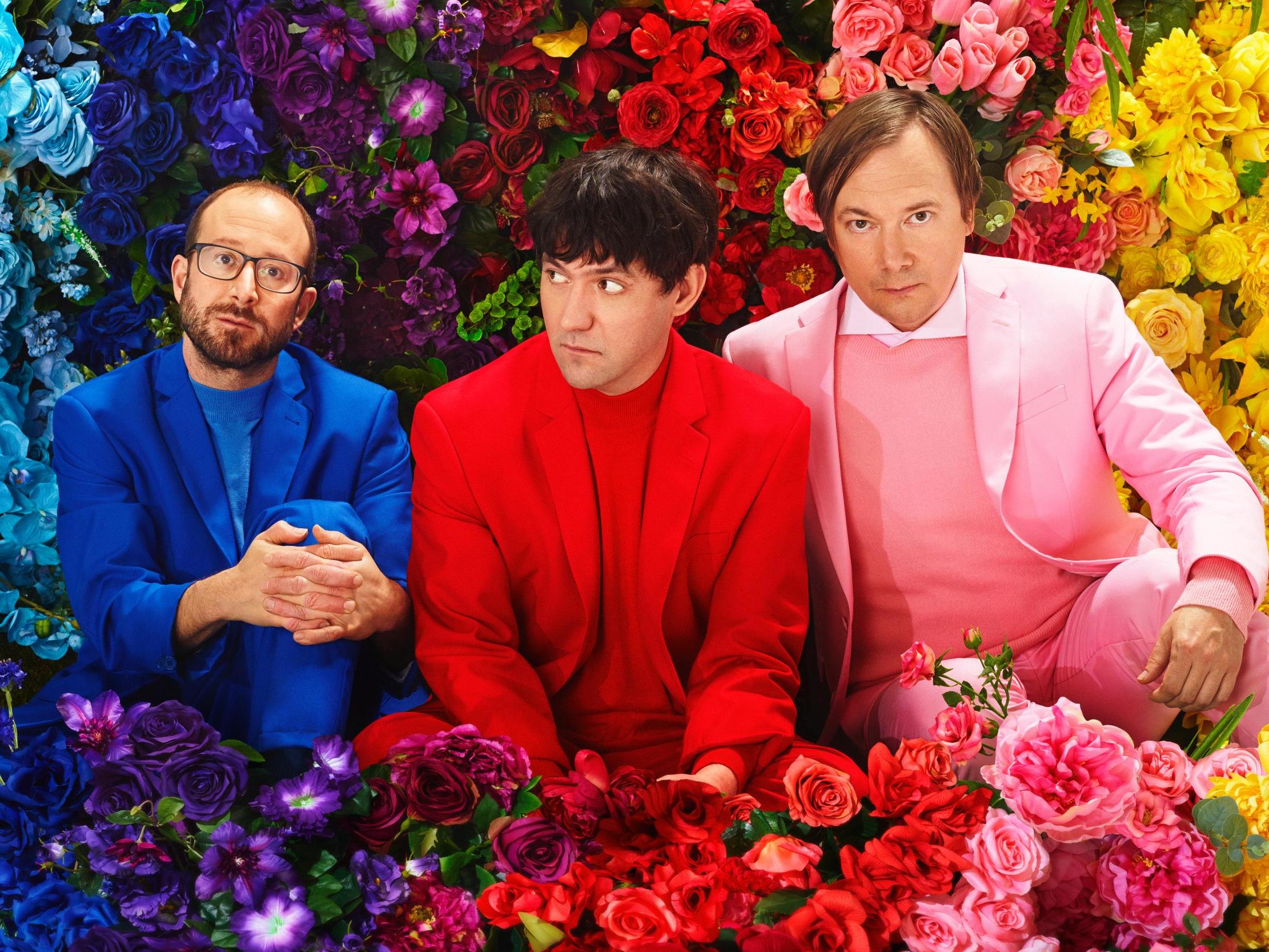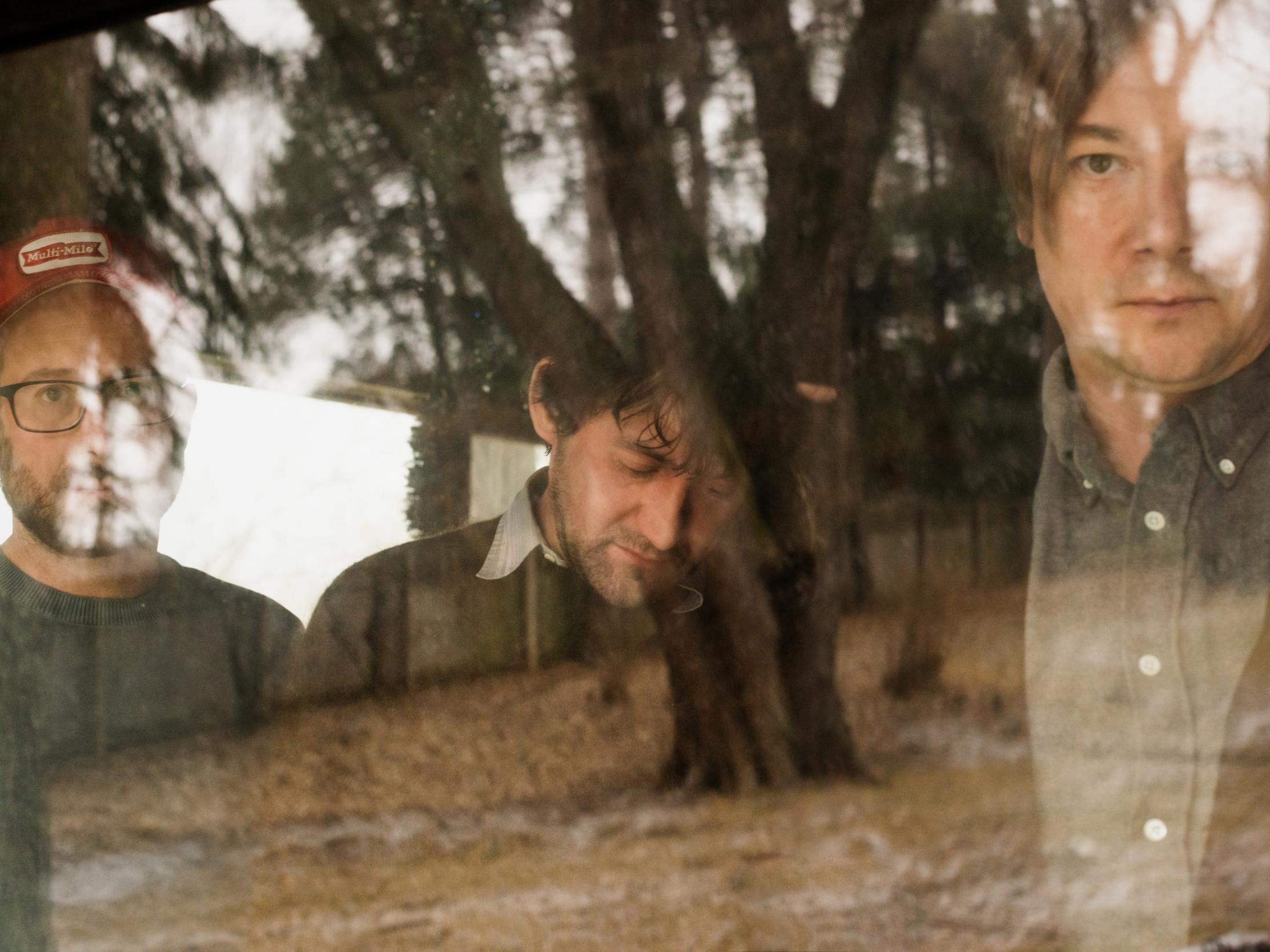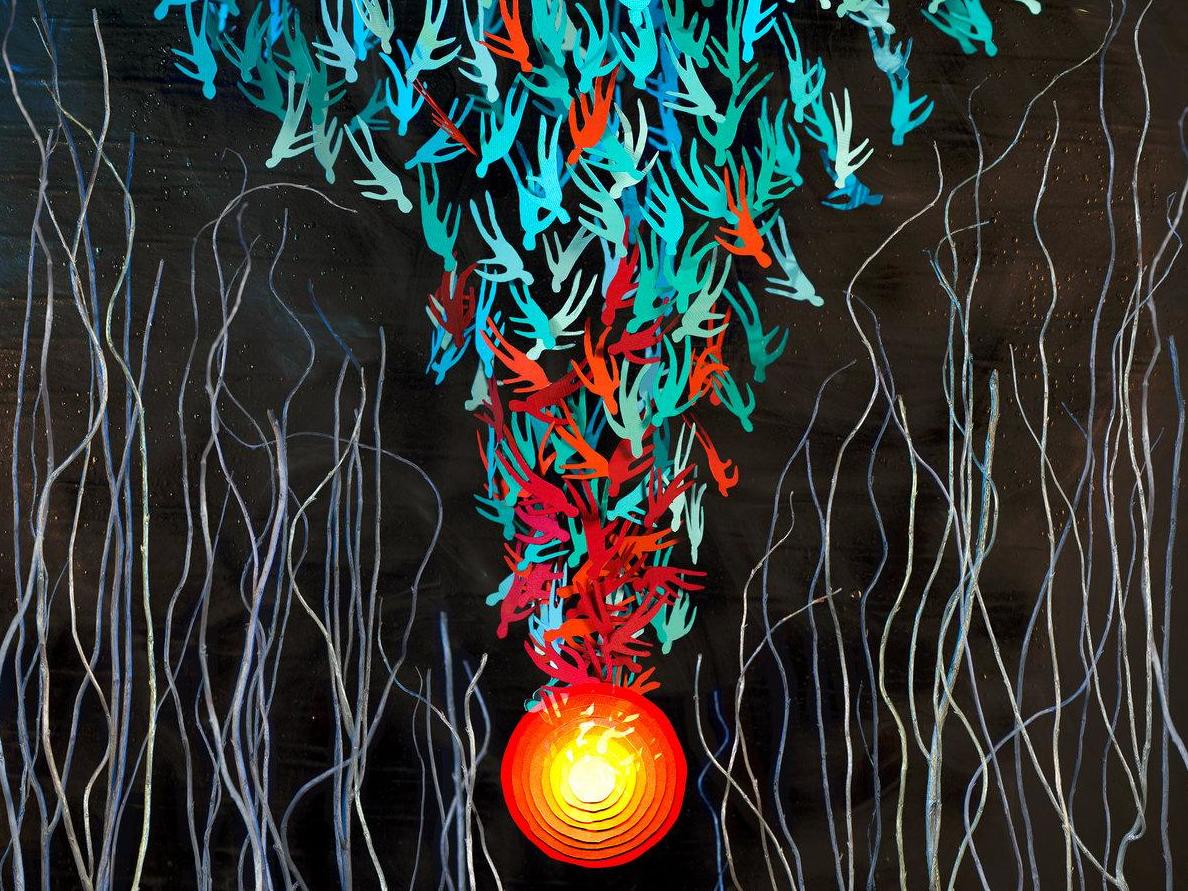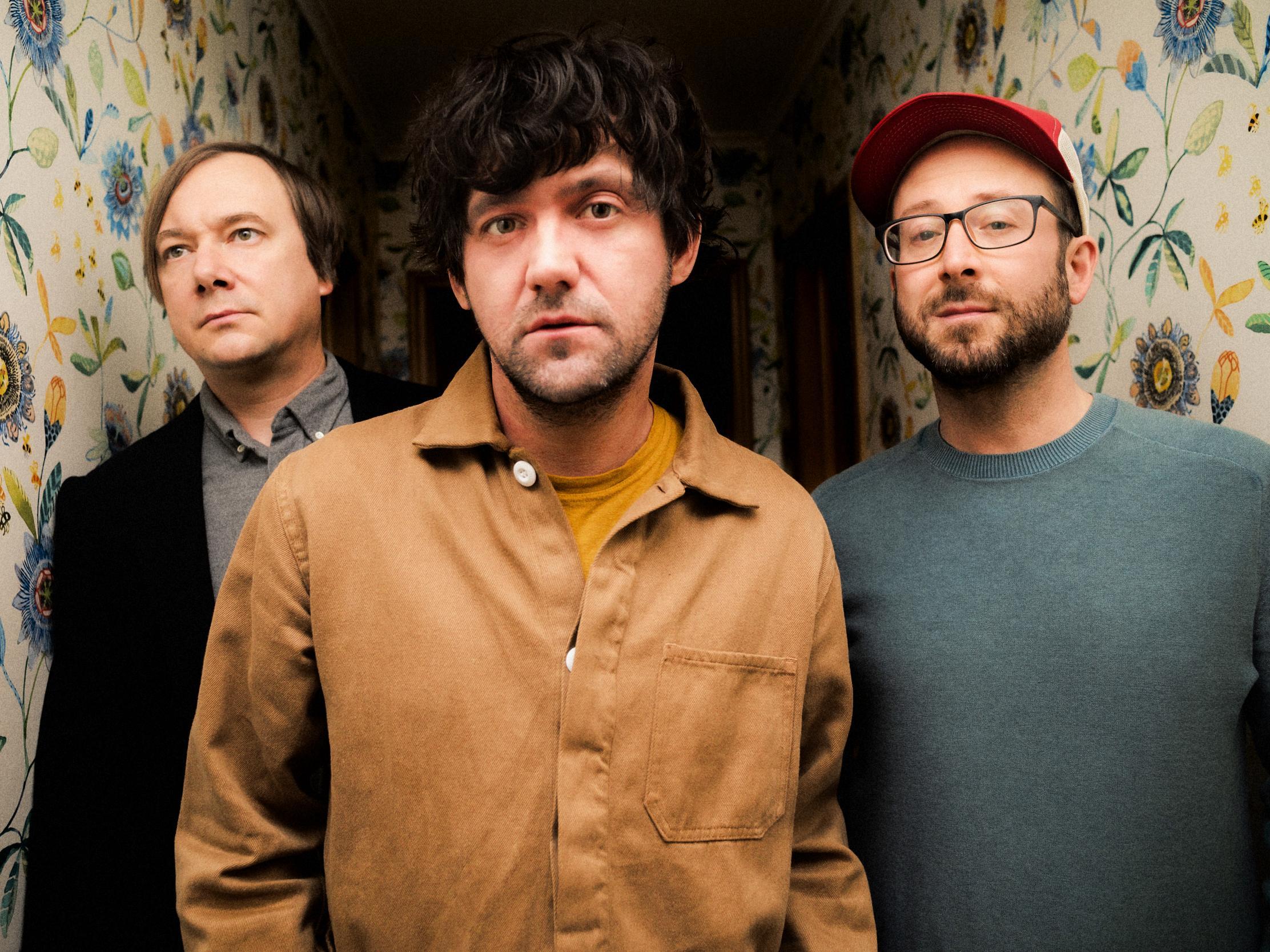Bright Eyes: ‘If you wanna tell someone you love ’em, today’s the day’
Conor Oberst has reunited with his former band and released a wondrous new album. He tells Mark Beaumont about the nine-year hiatus that became a waking nightmare, and his fears that Trump will try to steal the US election

The last thing you expect from an encounter with Bright Eyes is an invitation to get the guns out. “You guys see how strong I am right now?” says Conor Oberst, fragile poet of freak folk, rolling up a sleeve to flex his biceps down the camera. “I mean, I think I’m just getting stronger.”
As his two bandmates start pulling their own strongman shapes and cajoling the interviewer to “take that shirt off!”, our Zoom meeting starts resembling a screenful of scam online dating profiles. But Oberst’s machismo is metaphorical, a nod to his fightback from the abyss. It’s been a tempestuous decade for the sensitive, quiver-voiced intellectual who emerged from Omaha, Nebraska, in 1995 aged just 15 and, with his band Bright Eyes, built a formidable cult following over nine albums of visceral, emotive Americana. The outsider icon who was hailed the new Dylan and broke the US Top 10 with seminal albums I’m Wide Awake, It’s Morning (2005) and Cassadaga (2007), then pressed pause on the band following 2011’s The People’s Key, claiming its course was run.
Rather than a new dawn for Oberst, the band’s nine-year hiatus became a waking nightmare. He suffered a painful, wrongful “cancelling”, debilitating illnesses, divorce and death in the family. Now he’s spontaneously reformed his legendary band because “it felt nice and comforting to make a record with old friends instead of new collaborators”.
All three Bright Eyes members remained close friends and collaborators throughout the break – Oberst and multi-instrumentalist Mike Mogis virtually share a backyard in Omaha – so getting back together wasn’t exactly Oasis. “It’s not like we were ever estranged,” Oberst explains. “There didn’t have to be a big rainy phone call from a phone booth, ‘let’s get the band back together!’ I just said it one night to Nate [Walcott, composer and multi-instrumentalist], and then we called Mike and he kind of agreed and it took two years to actually make it.”
Dedicated fans will find much succour in their new, wondrous 10th album Down in the Weeds, Where the World Once Was. While trying to avoid creating “a make-believe time machine reunion thing”, it is intended as a nostalgic through-line to their initial era, incorporating the orchestrations of Cassadaga, the studio trickery of 2005’s Digital Ash in a Digital Urn and the blown-out acoustic punk of their earliest albums. “There are touchstones of past records,” Oberst says. “When you put it all together it sounds like a Bright Eyes record. We were conscious of having this record fit... to not stick out like a sore thumb.”
As a band associated, for many, with tortured youth, how does it feel being a 40-ish Bright Eyes? “I was always writing from wherever I was in my life at the time and trying to articulate whatever that was, so it doesn’t feel disingenuous or too strange,” Oberst says, before reaching for another bright-eyed distraction. “Cyndi Lauper once told me growing old sucks,” he says, flexing his much-missed humour muscle once more. “In a Long Island accent. With green hair. In a Japanese airport.”
The reunion has clearly done Oberst the world of good. The pandemic has been “a challenge” that’s “taken the wind out of my sails... I can’t say I’m in my happiest place right now” – he particularly misses his escape routine of jumping on a plane to visit friends in New York, New Orleans or LA “to elevate my mood if I was feeling dark”. But his trajectory has been upward. “I was doing really pretty good for the last couple of years,” he admits, twisting a baseball cap on his tumbling lockdown hair and diverting our discussion’s darker turns with comic asides, a far brighter presence than the broken, brow-clutching figure encountered in interviews for 2016’s desolate solo album Ruminations.
“That’s a much more sadistic, f***ed-up record to listen to,” he says of an album composed while recuperating from anxiety, laryngitis and a cyst on his brain, and wracked with references to suicide, sickness, frailty and addiction. In its wake, Oberst’s brother Matthew died suddenly aged just 42, and Conor’s seven-year marriage to Mexican musician Corina Figueroa Escamilla ended, amicably. He’s referred to this period as a “very dark place in my life”. Was 2017 the lowest point?
“How low can you go, y’know?” he says. “It’s like a limbo, you gotta go under the thing. I don’t believe in rock bottom, baby, I can drill down into the earth!”
Enjoy unlimited access to 100 million ad-free songs and podcasts with Amazon Music
Sign up now for a 30-day free trial. Terms apply.
ADVERTISEMENT. If you sign up to this service we will earn commission. This revenue helps to fund journalism across The Independent.
Enjoy unlimited access to 100 million ad-free songs and podcasts with Amazon Music
Sign up now for a 30-day free trial. Terms apply.
ADVERTISEMENT. If you sign up to this service we will earn commission. This revenue helps to fund journalism across The Independent.
“Hot Car in the Sun”, the most downbeat song from the new album, seems to reference this period directly. “Made my bed and I brushed my teeth/ Didn’t think about dying/ Got up to face another day,” Oberst sings, sounding scooped out, hollow, “It’s just painful to walk around/ It’s just painful to talk out loud”.

“I wrote that song more recently,” Oberst says. “If you’re asking if I ever think about suicide or something like that, yes, of course, many times. I’ve been obsessed with death since I was [Zoom glitch] years old and it’s never stopped. I’ve tried all kinds of different methods of dealing with mental health. I had a lot of tough times, but my hope is that the songs that I write encapsulate as much as I can the entirety of the human experience, or how strange it feels to be alive. We all know that there’s beauty and terror and everything in between. Some songs and some lines definitely feel like some kind of message in a bottle crying for help but I’m really not. I’m expressing a feeling that I had on a given day, that’s what came out.”
Oberst’s songs are often deeply honest, personal and wrought with a tremulous emotion. Before age afforded him a certain composure, the fervent edges of early records such as Lifted or The Story Is in the Soil, Keep Your Ear to the Ground (2002) or I’m Wide Awake… could feel like listening to a disturbed folk singer on the brink of breakdown. “It’s always been a pretty big quality of my songs to sing from where I’m coming from at whatever point in life I’m at,” he says, but stresses that his lyrics aren’t so much open diary entries as “composite sketches… a surrealistic smash-up” constructed from experiences of his own and those around him and hoarded in “the storage room of my brain”.
Yet even by Oberst’s standards, Down in the Weeds... is a brutally revealing record. His divorce appears to be intricately dissected, from the distrust, wanderlust and flying plates of “Comet Song” to a sickening moment on a ferry on “Dover to Calais” when “I just knew that it was over”. Elsewhere his brother looms large; visiting Oberst as a ghost on “Tilt-a-Whirl” and discussed during “Pageturner’s Rag”, the hallucinogenic opening conversation piece (a Bright Eyes album tradition) recorded during a three-hour mushroom trip with Oberst’s ex-wife and his mother. Is that a normal Friday? “No – me and Carina, we’ve done mushrooms a lot of times together, but my mom had never done them, so it was a new experience for her. She was interested and I thought it might lead to a different conversation. I think she had a good time.”
The album also, he insists, has “a good bit of hope and the idea of resilience”, evident in the positivity-or-bust tone of “Dance and Sing” and in the fatalistic “Tilt-a-Whirl”: “Life’s a solitary song/ No one to clap or sing along/ It sounds so sweet and then it’s gone/ So suddenly”. Has losing his brother given Oberst a new perspective on life, that there’s no time to wallow?

“I don’t think it’s a good idea to waste time, and I don’t think it’s a good idea to not say things that you mean to people,” he says. “That’s a pretty Hallmark card message to send out to the world, but if you wanna tell someone you love ’em, today’s the day to do it because you never know what’s coming. Also, I really do believe in forgiveness as the antidote to all these other emotions we have. We all carry so much baggage and bulls*** inside of ourselves. I’m talking about literally forgiving someone for something that was maybe pretty horrible, or vice versa, to be forgiven. That feeling is one of the highest human experiences. To be able to do that or receive that is a transcendent move, it’s like a chess move, a checkmate situation. I don’t wanna carry anything inside myself, I wanna forgive everybody.”
It feels like a pivotal psychological shift for Oberst. The root of his turbulent decade was in 2013, when a woman posted an allegation of sexual assault against him in an online chatroom, which was then amplified across the blogosphere. Six months and one lawsuit later she retracted her accusation as “100 per cent false”, but by then Oberst was in a downward spiral in terms of his health, career and mental wellbeing, from which he’s only now recovering. Has he finally been able to put the allegations behind him? “That’s a perfect example. Obviously one of the most painful things I’ve ever experienced and yeah, I’ve forgiven it. That was a tough thing – I never knew the person or had any contact with them so I couldn’t really forgive them to their face, but I can forgive them in my heart and understand where someone’s coming from in the sense of they have a really tough life and they’re trying to deal with it through these wild internet games that people play. It took me a long time to get to that point, but I hold no animosity and wish her and her family well.”
Surprisingly, his experience hasn’t hardened him against what became known as cancel culture. “I really have to separate it into two different categories,” Oberst says. “What I experienced was a person that had a lot of psychological problems and a long history of doing this kinda catfishing wild stuff on the internet and she was going through a lot of horrible things ... so her outlet was to go to these chatrooms and try to find connection and get empathy [from] other people by telling fantastical stories. Mine happened to be one of them … she hadn’t done it just with me. She had told people she had cancer, it was a pattern of behaviour that I think made her feel better ... I think it was much more predicated on people that feel isolated and alienated, their reliance on the internet to get some kind of human connection. I honestly don’t think she meant it in a weird way, I think she stumbled into it and then all the bloggers and people made it into what it was. So in a weird way I blame the journalists and other people more than I blame her.”
Does he differentiate that from people with genuine grievances? “Yeah. As far as #MeToo and all of that, if we’re talking societal, I think it’s a positive thing. There’s a lot of f***ing bad dudes, shady motherf***ers that have gotten away with stuff. Go down the list – Harvey Weinstein, Bill Cosby, blah blah blah… Those guys that are doing that kind of thing, they’re monsters and they should be taken down.
“Epstein, these really pathological, sick offenders, yes, let’s eradicate them, let’s put them in jail, that’s where they should be. If your pattern is to abuse that many people that consistently and that methodically then you should be in jail. And then there’s a whole grey area of people’s interactions that are sometimes… it’s hard to understand, some people thought something meant something, some people thought something meant something else, and then you’re arguing over these details that no one will ever know because there were only two people around. I think it’s not unreasonable to have the default to believe the woman and then from there you’ve gotta look at whatever situation happened, because shit can be kinda cloudy sometimes.”
Oberst has, understandably, pondered the subject long and hard. “There’s no doubt that women have been deeply oppressed by men and put through terrible things, so if they’re getting a little bit of a shot to have their stories told and have accountability for really terrible things that have happened to them, I think that’s a good thing,” he says. “If we’re striving for equality and for everyone to have a fair shake in the world we have to reckon with this stuff. It’s uncomfortable and it’s painful and some people are gonna get bulldozed in a way that’s unfair, sure [but] at a certain point, as a society, if you can’t look yourself in the mirror and address these things then how do you ever change them, how do you ever improve them? There’s elements of cancel culture that are a little absurd, but I would say it is valuable that people start to learn those lessons and start to think differently about how they treat people.”
As the band behind the Bush Jr era’s prime indie protest anthem “When the President Talks to God” in 2005, America’s current state of disaster politics isn’t far from Bright Eyes’ thoughts either. We speak on the day that news breaks of Trump’s attempts to sabotage the US Postal Service to discourage voting ahead of the November election, as though he’s in the process of actually dismantling American democracy. “Not just today,” says Walcott, “for the past three years he’s been working on this. You could go back even further.” “Now it’s ridiculously obvious,” Mogis adds. Will the pandemic spell the end of Trump? Oberst shrugs. “Sure hope so.”

The pandemic has certainly exposed the worst elements of western society, from the inhumanity of US healthcare to racial and social inequality and the economic precipice upon which we all teeter. “It’s so f***ing psychotic that literally in my lifetime I would never imagine how many of my friends are on unemployment,” Oberst says. “Totally average, middle-class, normal people working at restaurants, they’re all on unemployment, all totally terrified about paying their rent. And that’s middle-class people, not to mention actual poor people who have no shot, who are definitely getting evicted and already don’t have healthcare. There’s something brewing here. All the racial justice protests after George Floyd’s death, that’s also growing, then you’ve got the pandemic and you’ve got this election where people are potentially scared of going to the polls. You’ve got a guy like Trump and the Republicans, they’ve proven themselves to be fully willing to cheat and lie and steal and now they have this opportunity... to potentially steal the election. There’s a confluence of things that are coming together that none of us have seen in our lifetimes.”
On the album, “Mariana Trench” paints pictures of earthquakes, tsunamis and capitalism in collapse. Will Covid bring the whole edifice down around us? “Capitalism in America is pretty resilient,” Oberst argues. “I wouldn’t predict the end of capitalism. It could be the end of a lot of people’s lives. It could be the end of people living inside of apartments. But something tells me the super-rich will find a way to stay super-rich.”
And what of “Just Once in the World”, which is basically a party for the end of humanity? “You’re invited, my friend,” Oberst chuckles. “I’ll get the piñata!”
Join our commenting forum
Join thought-provoking conversations, follow other Independent readers and see their replies
Comments
Bookmark popover
Removed from bookmarks